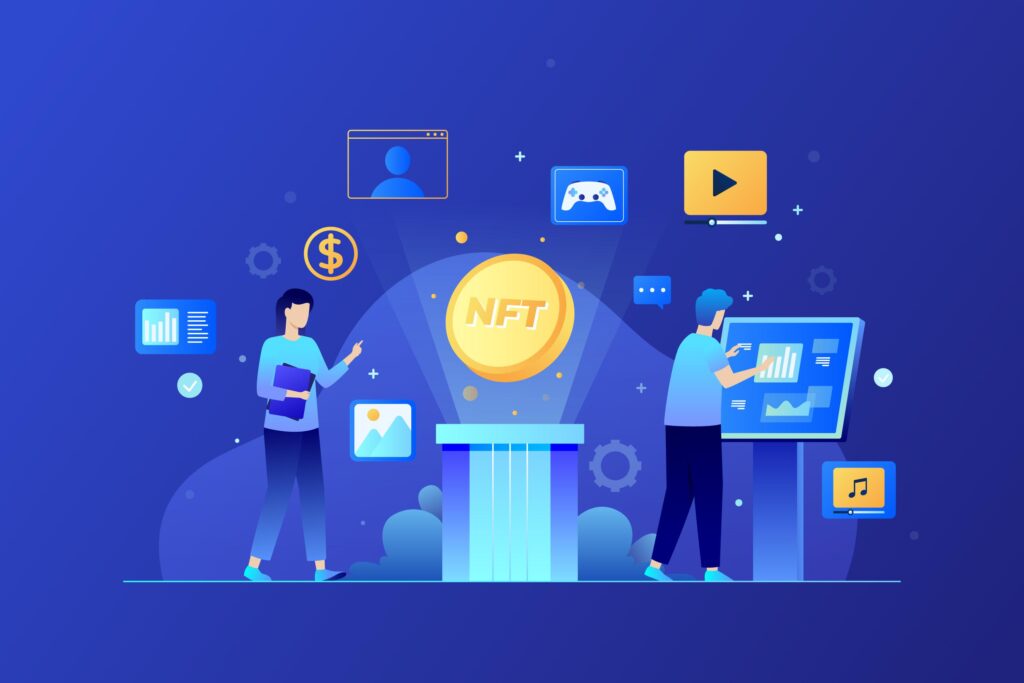You may currently be wondering what an NFT is, as everyone seems to be talking about it. It is a Non-Fungible Token, according to the meaning of its acronym. Understanding it is very simple: these are digital tokens that represent a certain property. This can be a real estate, a video game or even… A real state inside a video game!. It also applies to artwork as well as web content in general. Here’s everything you need to know about NFT.
Everything you need to know about NFT
Technologically, NFTs have a close relationship with cryptocurrencies. This is because they are units of value assigned to a particular non-expendable property. However, they are not the same, since Bitcoin, when worth a certain amount of dollars (for example), is transformed into a non – fungible property. On the other hand, one NFT cannot be exchanged for another or modified on the basis of something of equal value. No two tokens are the same, there may be copies, but never replacing the original.
The best explanation for you to understand what NFT means is a painting in art galleries. In fact, this world is being positively influenced by the NFT, as it fell right under their thumb. Those who are dedicated to illustration can be benefited by the NFT, placing the value they want to their original works. It should be noted that until recently, someone paid 260 thousand Euros for a drawing… From a stone!
Like most cryptocurrencies, NFTs work through blockchain technology. It is a network of computers that use cryptography and a system of blocks or nodes. It is a giant ledger where transactions are irreversibly recorded and data cannot be modified in any way.
In the case of NFTs, they are assigned a certificate of authenticity, with metadata that is also impossible to modify. Likewise, all transactions made with that token are recorded, in order to be able to track it. For example, if you buy content associated with an NFT, you’ll always be able to know what value it had the first time it was sold, as well as every other time before it came to you.
How to trade NFTs
As complex as it sounds, operating with NFTs is not a difficult task. Currently there are several platforms that offer the possibility to create a user, associate a cryptocurrency wallet and proceed to create the Non-Fungible Tokens of your preference. It should be noted that according to the page and the type of good you want to sell, doing so can cost between $1 and $ 100 or more. It all depends on the blockchain to which the token is associated. Among the best pages are:
- OpenSea: it is the most popular in current times and offers a wide variety of non-expendable tokens. You can find artwork, cards, illustrations or domain names. To use this platform you will simply need to have an Ethereum wallet.
- Foundation: it is a platform that allows you to operate with NFTs and that is focused on creators and collectors of digital art. Artists receive 85% of the final price at which they sell and since its launch this platform has earned more than $40 million dollars.
- TikTok TopMoments: now TikTok users can market videos that have been viral or have set trends in the world. In the same way, they can associate with various digital artists and sell both limited edition and unique tokens.
- Valuables: this platform is exclusively focused on marketing tweet. Notably, the first tweet in history was auctioned at $2.9 million. To use this platform, you will need to have the Ethereum wallet, MetaMask.
Is it worth buying NFTs?
Why if Non-Expendable Tokens are not so easy to exchange, have they caused so much stir? The answer is simple; because of the value they could have in the future. That is, if you buy a drawing in 5.000 Euros, you can probably sell it at a higher value as the years go by. However, is this a big risk? Is it worth buying NFTs? There is still no concrete answer.
Many people are focusing on buying NFTs and making transactions that involve a lot of money. However, just as with cryptocurrencies, it is necessary to have a little prudence within this class of investments.
Some experts point out that NFTs may be a speculative bubble and may end up completely undervalued in the not-so-near future. Similarly, they point out that since they do not have legal authority to regulate them, it is very difficult to appeal to the justice when it comes to plagiarism or theft. In fact, there could not be missing the phishing scams, where fake works are sold under the name of a renowned artist.

